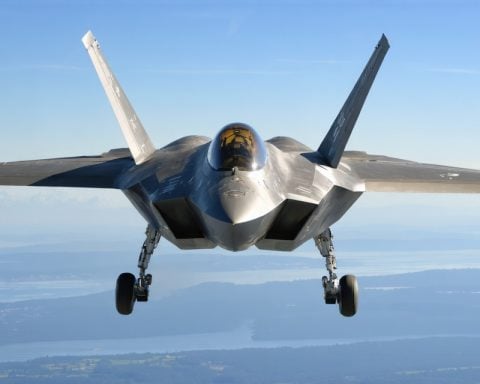In a critical development, the Netherlands’ top judicial authority, the Supreme Court, has been guided to maintain a contentious decision that could halt the trade of F-35 parts to Israel. Earlier this year, the Court of Appeal in The Hague mandated the Dutch government to cease these exports due to fears the components might facilitate breaches of international laws during the Gaza conflict.
The government, disagreeing with the appellate court’s decision, sought a final verdict from the Supreme Court. However, the Supreme Court’s advocate general firmly recommended upholding the previous ruling. He argued that there is a tangible danger that Israel’s use of F-35 fighter aircraft could lead to significant violations of international humanitarian law within the Gaza region.
The initial ruling in February was a response to heightened international concerns over the military actions in Gaza. It prompted vigorous debates within the Dutch political landscape, with many weighing the nation’s defense trade practices against its commitment to international legal standards.
This advice from the advocate general is pivotal, as it suggests that the lower court’s judgment was both appropriate and necessary under the circumstances. The decision marks a pivotal moment in international arms trade discussions and the broader implications for military ethics and humanitarian law. The final say now rests with the Supreme Court, which will determine whether the Dutch government must implement an export blockade to Israel.
How the Netherlands’ Stance on Arms Exports Could Reshape Global Defense Policies
The recent developments in the Netherlands regarding the trade restrictions on F-35 parts to Israel have significant implications for international relations, defense policies, and the evolving landscape of military technology. This decision not only affects the Netherlands and Israel but also sets a potential precedent for other nations grappling with similar ethical and legal dilemmas.
Implications for Global Arms Trade
The push by the Netherlands’ judicial authorities to potentially halt the export of F-35 components to Israel highlights a growing tension between national interests and international humanitarian standards. This case underscores the power of judicial systems to influence global arms trade policies, beyond the control of conventional governmental channels. If the Supreme Court supports this ruling, it could encourage other countries to re-evaluate their arms export practices, particularly to regions experiencing ongoing conflicts.
Technological Advancements and Their Ethical Dilemmas
The controversy over F-35 exports raises broader questions about the responsibilities that come with cutting-edge military technologies. As defense technologies like the F-35 become more advanced, the potential for their use in complex conflict zones grows, raising ethical questions surrounding their export and deployment. Countries may need to consider stricter regulations and transparency measures in their arms trade agreements to align with international humanitarian law.
Advantages and Disadvantages of Halting Military Exports
One advantage of restricting such exports is the alignment with international law and ethical standards, potentially reducing the risk of complicity in international conflicts. This can also improve a country’s international standing and credibility as a proponent of peace and human rights. However, the disadvantages include potential diplomatic tensions and economic impacts. Export bans can lead to strained relationships with allied countries and have financial repercussions for domestic defense industries reliant on international contracts.
Controversies and Discussions
This landmark case provokes several crucial questions: Should ethical considerations override military alliances in arms trade agreements? How can countries balance national security interests with global peace efforts? These debates are essential as nations navigate the complexities of modern warfare and international diplomacy.
Future of Arms Trade Legislation
The outcome of the Dutch Supreme Court’s ruling could shape future legislation on arms trade globally. It could inspire stricter controls and more robust frameworks for evaluating potential humanitarian impacts before authorizing such exports. Ultimately, this shift could contribute to a more ethical approach to international defense trade.
For further insights into international trade and humanitarian law, visit Human Rights Watch and United Nations.







